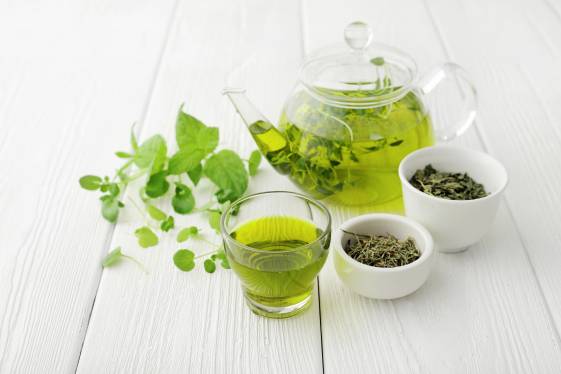Green tea or Camellia sinensis is a kind of tea plant that has been used since ancient times in China and Japan. It is also called “the elixir of life” because of its health benefits. The leaves contain antioxidants, such as catechins and caffeine, which are responsible for the many claims about green tea being an “acidic” beverage. However, all this information is misleading because it was not tested by medical experts and it does not provide proof that green tea is an acid-producing food or that it can be used for weight loss. The scientific studies that have been conducted have shown that the amounts of natural catechins in green tea are not high enough to produce any acidic effect on the body.
What Is Green Tea?
Green tea refers to the processed, dried leaves of the camellia sinensis plant. It contains antioxidants known as catechins and caffeine, which are small molecules with potent effects on human health. Green tea is grown all over the world, especially in China and Japan. It has been used for thousands of years in both cultures to improve health and to reduce fatigue.
The Health Benefits of Green Tea
Green tea is widely consumed by many people around the world. It is often included in different types of beverages such as coffee, fruit juice, milk or soda. In addition to its beneficial effects on human health, green tea provides a number of other benefits:
Lowers Cholesterol Levels
Green tea is rich in flavonoids that limit the production of LDL cholesterol, which is known to increase the risk of cardiovascular disease. The polyphenols present in green tea have antioxidant properties, which help to prevent the oxidation of LDL cholesterol in the liver. Therefore, they are believed to reduce your risk for heart disease by decreasing levels of bad cholesterol in your blood.
May Help Prevent Cancer Growth
Catechins are powerful antioxidants that can reduce cancer growth and reduce the risk of cancers such as breast, colon and prostate. Catechins present in green tea inhibit the progression of tumors and help to control cells that can lead to cancer growth.
Fights Fatigue and Weakness
Catechins found in green tea improve energy levels by increasing blood flow throughout your body, which allows for better absorption of glucose and other nutrients. Catechins also promote tissue regeneration and repair damaged muscles. Caffeine, which is a stimulant in green tea, improves mental alertness and reduces feelings of fatigue.
Protects the Brain from Damage
Catechins decrease the risk of cognitive decline by protecting your brain cells against free radical damage. The flavonoids present in green tea are also believed to fight diseases including Alzheimer’s disease, Parkinson’s disease and other forms of dementia. Catechins also reduce inflammation throughout your body, which can prevent cognitive decline as well as certain types of cancer.
Reduces Blood Pressure
Green tea contains caffeine, which is a stimulant that increases your activity levels and improves mental alertness. The caffeine in green tea has been shown to reduce the risk of high blood pressure by lowering your resting heart rate after a period of rest. Studies have also detected an increase in dopamine, a neurotransmitter associated with positive emotions, when drinking green tea. This means that catechins found in green tea can lower your risk of high blood pressure and improve brain function.
Prevents Heart Disease
Drinking green tea has been shown to lower your risk of heart disease by improving your overall health and decreasing inflammation in the body. Green tea can also help prevent your blood from clotting by reducing the levels of plasminogen activator inhibitor-1 (PAI-1), a protein that can promote clotting. In addition, green tea contains flavonoids that have been shown to prevent the oxidation of LDL cholesterol, which helps prevent the buildup of plaque in your arteries.
Boosts Immunity
Drinking green tea may help boost your immune system by increasing levels of natural killer cells, which are cells that destroy viruses and bacteria. This effect may be due to compounds called catechins found in green tea that increase production of interferon gamma, an important type of protein involved in activating your immune system cells. Catechins in green tea have also been shown to activate the enzyme nitric oxide synthase, which produces nitric oxide, a molecule that can help your immune system destroy bacteria and viruses.
Decreasing Inflammation and Oxidative Stress
Drinking green tea may help reduce inflammation in your body by reducing oxidative stress. Oxidative stress occurs when the reactive oxygen species produced by your body are not properly controlled. Studies have found that green tea has antioxidant properties that can help reduce oxidative stress and protect cells from damage caused by free radicals. Catechins in green tea have also been shown to inhibit enzymes that promote inflammation, including cyclooxygenase-2 (COX-2), which is responsible for the production of prostaglandins, substances that can cause inflammation.
Why is green tea acidic?
Green tea is acidic, but not in the same way as lemon juice or orange juice. Green tea contains a special type of polyphenol called catechins. These catechins chemically react with water to form a compound known as aqua-catechins. This process results in a pH of about 4.7 for most varieties of green tea, which is somewhat lower than that of lemon juice and orange juice (pH 5 to 7).
In addition to being slightly less acidic than lemon juice and orange juice, green tea contains other compounds that can affect its pH. These include sesquiterpenes known as catechins, polyphenols called flavonoids, and caffeine.
Conclusion
Yes, green tea has some degree of acidity in it, but not enough to cause any unwanted side effects. Those who are sensitive to acid content in foods may have an issue with green tea, but there are no noticeable side effects when taken at recommended dosages. Those who are sensitive to caffeine may need to avoid high doses of green tea extract or lose the benefits of its antioxidants.
Enjoy your cup!


